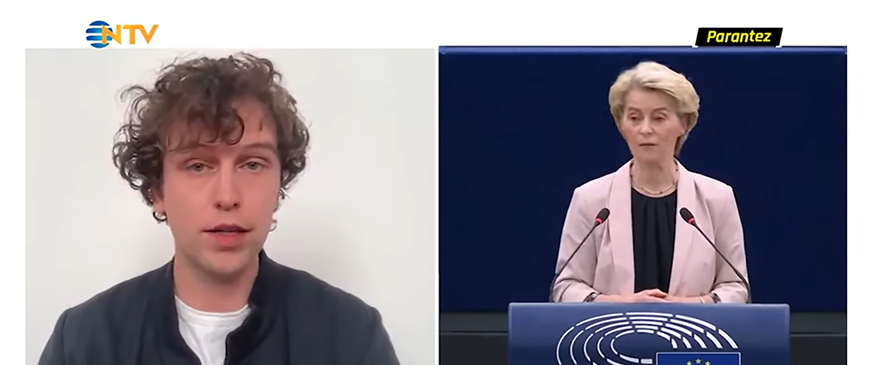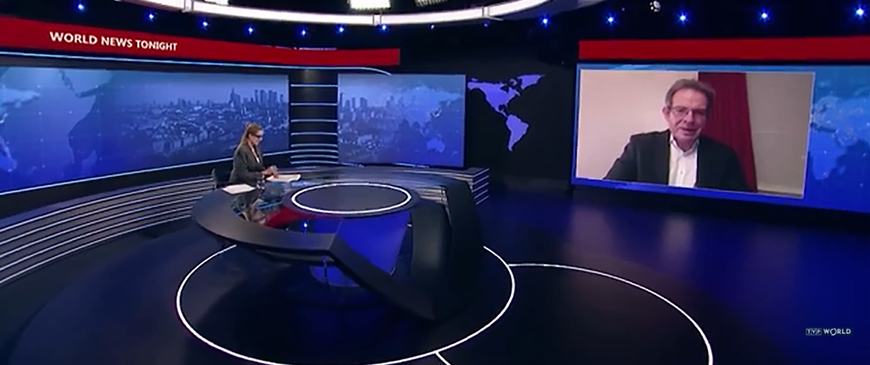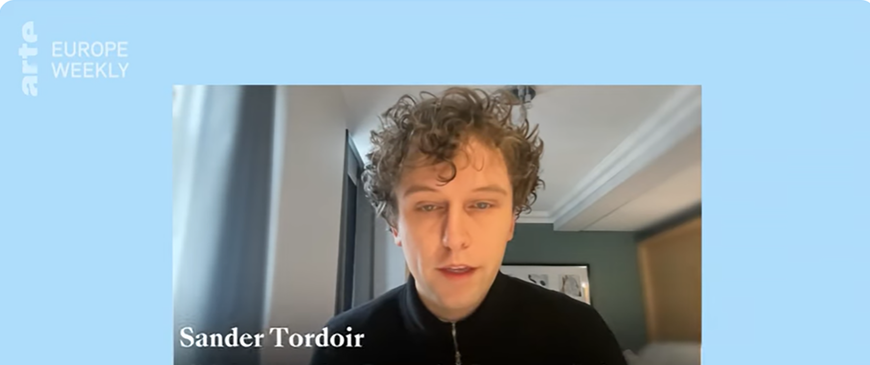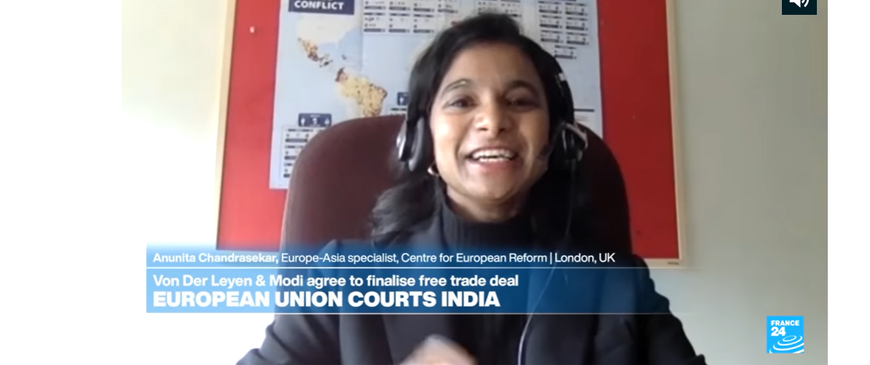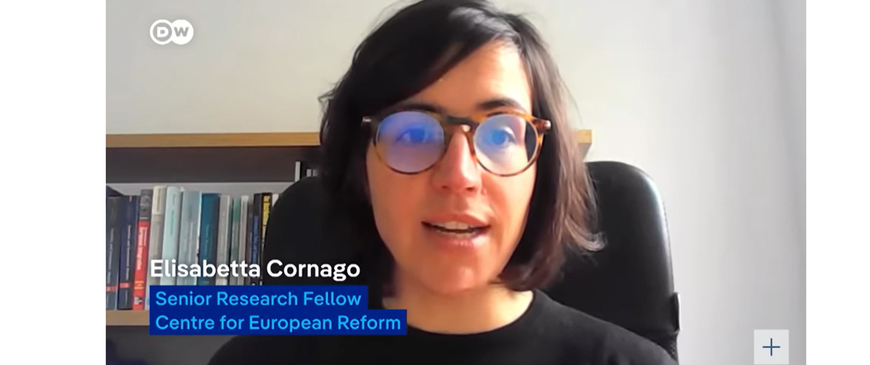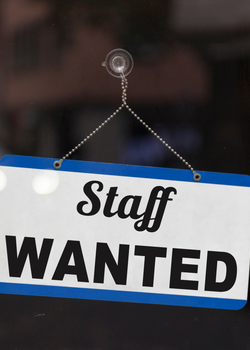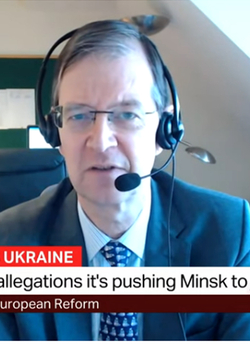Press
CER podcast: Brexit and the labour market
25 January 2023
In this week’s episode of the CER podcast Jonathan Portes and John Springford discuss their recent post-Brexit labour market analysis.
‘Messy’ German tank saga highlights Berlin as ‘soft underbelly’ of Europe
25 January 2023
iNews
Others agreed that it reflects badly on Berlin. “Germany currently lacks a strategic culture and failing to see the bigger picture,” says Ian Bond director of foreign policy at the Centre for European Reform. “This episode delayed the moment that Ukraine gets weapons. It is bad for European cooperation, as it says you might have to think twice about working with Germany. And it is bad for Germany security as it will encourage Putin to think Berlin is the soft underbelly.”
Rasmus Paludan kaster Sverige ud i hidtil største krise med Tyrkiet
24 January 2023
Politiken
Det er en udlægning, som den britiske sikkerhedsekspert Ian Bond er enig i. Han er tidligere topdiplomat og nu direktør ved tænketanken Centre for European Reform. »Når Erdogan kan vise, at han er hård mod de kurdiskforsvarende skandinaver med deres foragtelige liberale ideer om ytringsfrihed og alt det der, så appellerer det til hans nationalistiske vælgere«, siger han. »Og den her ekstremt tåbelige og provokerende afbrænding af en koran her i weekenden betyder, at Erdogan kan vise sine islamiske støtter, at han forsvarer islam ved at stoppe de gudløse skandinavers forsøg på at komme ind i Nato«, fortsætter sikkerhedseksperten.
For British farmers, the effects of Brexit have become clearer
23 January 2023
The New York Times
Two years after Britain left the European Union’s economic area, ending the ability of the bloc’s citizens to automatically work in Britain, the effects of Brexit are unfolding across the economy. One of the clearest is a shortfall of around 330,000 workers, mostly in less-skilled jobs, including transportation, retail and hospitality, according to the Centre for European Reform and UK in a Changing Europe, two research institutes.
Can robots really plug the workforce shortage left by Brexit?
22 January 2023
The Observer
Migration was quite a big deal, Brexit-wise, but six years on, and two after the end of free movement, what has been the impact? The level of net migration certainly hasn’t fallen, but a new report from Jonathan Portes and John Springford argues that if you focus on workers, the end of freedom of movement has left about 330,000 fewer in Britain (460,000 fewer Europeans, but 130,000 more from elsewhere). That’s a reduction of roughly 1% of the labour force, prompting many to say that a lack of migration drove recent economy-wide labour shortages.
How the Franco-German axis still needs care and attention 60 years on
22 January 2023
The Sunday Times
Charles Grant, director of the Centre for European Reform, says [Franco-German relations] have not been so bad since 1998, when Gerhard Schröder, newly elected as German chancellor, ruffled French feathers by paying his first visit not to Paris to meet Jacques Chirac but to London, to see Tony Blair.
To go or not to go? Von der Leyen’s Covid committee dilemma
20 January 2023
Politico
“I think this [Qatargate] will make it less likely for von der Leyen to co-operate with the Parliament,” said Camino Mortera-Martinez, head of the Brussels office at the think-tank the Centre for European Reform. She said the Commission president is riding high after weathering a pandemic, and now the war in Ukraine.
The post-Brexit labour shortfall
19 January 2023
Financial Times
This week Jonathan Portes and John Springford published a joint paper for the UK in a Changing Europe and the Centre for European Reform that assessed the shortfall in the UK labour market caused by Brexit. The number they came up with was 330,000 — about 1 per cent of the total UK workforce — but the shortfalls for workers from the EU landed more heavily on the lower-wage sectors that relied previously on flexible EU labour, like logistics (128,000 or 8 per cent of the sectoral workforce); hotels and restaurants (67,000 or 4 per cent), shops (103,000 or 3 per cent), building sites (46,000 or 2 per cent).
Fraught departure from EU shrinks workforce
19 January 2023
China Daily
For many years, freedom of movement gave the British economy a supply of cheap EU labor. But with the Brexit agreement having ended that, the labor market is now feeling the pinch, with around 330,000 fewer workers available.A study by the independent think tank Centre for European Reform highlighted the fluctuating numbers and changing face of the British labor market, which has been transformed and depleted.By June, there had been a rise of 130,000 non-EU workers compared to a situation where post-Brexit immigration controls were unaltered, but this was offset by 460,000 fewer EU workers.
How many workers has the UK lost due to Brexit? Researchers have a bleak answer
18 January 2023
The Huffington Post
Brexit is behind a labour shortfall in the UK according to new research, leaving the country with 330,000 fewer people in the workforce. A joint report from think-tanks the Centre for European Reform and UK in a Changing Europe looked into this stat to find out how many people chose not to work in the UK because of Brexit.
Shortage of 330,000 workers in the country due to Brexit: is it bad for the economy?
18 January 2023
Talk Finance
The immigration restrictions in the United Kingdom, which were introduced after leaving the European Union, have led to a shortage of 330,000 workers in the country. Sectors with low-skilled labour, such as retail, hospitality, transport and storage, are particularly hard hit by the end of free movement of persons between the UK and the EU, reports the London-based think-tank Centre for European Reform (CER).
Kaili out, Angel in: Is the EU Parliament starting afresh?
18 January 2023
Deutsche Welle
Analyst Camino Mortera of the Centre for European Reform, is worried that the European Parliament is underestimating the extent of reform needed. "I don't think that the parliament itself has realized that by not reforming, by not taking this chance to do something significant against these kind of behaviors, they are opening themselves up to more criticism," Mortera told DW.
Brexit has only cost us and the worst is yet to come
18 January 2023
The New European
John Springford’s latest work for the Centre for European Reform puts the figure at 5.5%. He uses a “doppelganger” economic model that compares the UK’s economic performance to a group of countries that have performed similarly in the past. The paths of the UK and its “twin” separate in 2016 and the gap between the two is now 5.5%. In short, if we had stayed in the EU we would be much better off than we are now.
Brexit is doomed, says Boris Johnson’s favourite newspaper
18 January 2023
The Independent (Ireland)
The ending of free movement is “contributing significantly” to labour shortages in the UK, the study by the UK in a Changing Europe and the Centre for European Reform found.The academics found that low-skilled sectors – including hospitality, retail, construction and transportation – had been badly hit by the loss of EU workers after Brexit.“Overall, the new system is working broadly as Leave advocates promised,” said co-authors Prof Jonathan Portes and John Springford, who said visa rules were “too onerous to compensate for the loss of free movement in low-skilled sectors of the economy”.
Brexit rules cost Britain 330,000 workers, economists say
17 January 2023
Bloomberg
Brexit immigration curbs have led to a shortfall of 330,000 workers in the UK, contributing to a tighter labor market and fueling inflation, a report showed. Low-skilled sectors including retail and hospitality have been hit hardest by the end of freedom of movement following the UK’s departure from the European Union, an analysis by the Centre for European Reform found.
TRT World: Why is Germany reluctant to throw its support behind Ukraine?
17 January 2023
Pressure is mounting on Germany to send Leopard tanks to Ukraine. Ian Bond, director of foreign policy at the Centre for European Reform, talks about why Berlin is hesitating to throw its support behind Kiev.
UK worker shortfall due to Brexit curbs estimated at 330,000
17 January 2023
Financial Times
The post-Brexit UK economy is facing a shortfall of more than 300,000 workers as the result of ending free movement of labour with the EU, according to a new estimate by leading researchers. The joint assessment from the UK in a Changing Europe and the Centre for European Reform think-tanks said that the ending of free movement was constricting the UK economy and “contributing significantly” to labour shortages in lower-skilled sectors, including logistics, construction and hospitality.
Shortfall of 330,000 workers in UK due to Brexit, say think-tanks
17 January 2023
The Guardian
Brexit has led to a shortfall of 330,000 people in the UK labour force, mostly in the low-skilled economy, a report by leading researchers has found.The departure from the EU in 2020 led to an increase in immigration from non-EU countries, but not enough to compensate for the loss of workers from neighbouring countries, according to the joint findings of the thinktanks Centre for European Reform (CER) and UK in a Changing Europe.
Brexit cost 330,000 drop in UK labour force, new research finds
17 January 2023
EurActiv
Brexit has resulted in the loss of 330,000 workers from the UK economy, according to new research published on Tuesday (17 January). The data published by the UK in a Changing Europe and Centre for European Reform thinktanks revealed that in September 2022, there were 460,000 fewer workers of EU-origin in the UK than if the UK had remained in the bloc, only partially offset by an increase of about 130,000 non-EU workers. The net loss of workers amounts to around 1% of the labour force.
Brexit has created shortage of 330,000 workers in UK, say economists
17 January 2023
The Independent
Post-Brexit immigration rules have led to a shortfall of around 330,000 workers in the UK, according to top economists.The ending of free movement is “contributing significantly” to current labour shortages, a joint report by the UK in a Changing Europe and the Centre for European Reform think-tanks has found. The study found the low-skilled sectors – including hospitality, retail, construction and transportation – had been badly hit by the loss of EU workers after Brexit.

